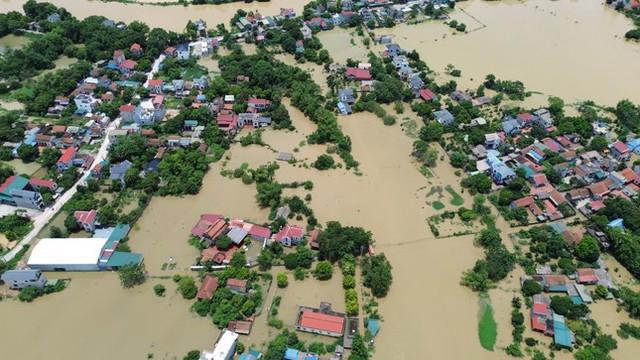Foreign governments and international organizations have quickly decided to send emergency aid to support Vietnam’s northern localities to overcome typhoon Yagi consequences, according to a report from the Government News.
On September 12, the Swiss Agency for Development and Cooperation (SDC) dispatched a team of six experts from the Swiss Humanitarian Aid Unit to Vietnam and earmark CHF1 million (about $1.1 million) to support people affected by Typhoon Yagi in Vietnam.
The team, comprising specialists in water and sanitation, emergency shelter, and disaster risk reduction, will assist the Vietnamese authorities in assessing needs and formulating short- and medium-term responses.
The SDC is also arranging to send relief supplies, including 300 family tents and two water distribution systems capable of serving 10,000 people. In the immediate term, the SDC is liaising with the Association of Southeast Asian Nations (ASEAN) to deliver essential goods financed by Switzerland to the affected areas.
The 1 million CHF-assistance is one of the largest contributors to the Disaster Response Emergency Fund of the International Federation of Red Cross and Red Crescent Societies (IFRC-DREF), which has likewise released funds to support relief operations.
On the same day, the Ministry of Foreign Affairs of the Republic of Korea (RoK) announced that the RoK Government decided to provide humanitarian aid worth $2 million to typhoon devastated localities in Vietnam.
The RoK Government hopes to contribute to the recovery of the affected areas and help people return to their normal lives as soon as possible, according to the announcement.
Also on September 12, the Japanese Government, through the Japan International Cooperation Agency (JICA), decided to provide emergency relief supplies including 40 portable water filters and 200 multi-purpose plastic canvas covers. The aid will be delivered to Viet Nam on September 16-17.
Meanwhile, the ASEAN Coordinating Center for Humanitarian Assistance on Disaster Management (AHA Center) also planned the delivery of a substantial aid package on September 13-14. The consignment will comprise 2,002 families and 1,008 home repair, 1,015 kitchen and 3,031 personal hygiene kits.
Australia announced an initial aid package worth AUD3 million ($2 million) to help Vietnam overcome the consequences of typhoon Yagi and subsequent flashfloods and landslides. An initial tranche of emergency relief supplies arrived in Hanoi on September 11 evening. The supplies included a vast array of critical items, including 264 personal hygiene kits, 120 kitchen sets, 264 home repair kits, 600 blankets, 600 sleeping mats, 522 canvas covers and 360 mosquito nets.
The U.S. Mission to Viet Nam, through the U.S. Agency for International Development (USAID) will provide $1 million in immediate humanitarian aid to support Vietnam’s efforts in overcoming the aftermaths of the natural disaster. The assistance will be allocated to humanitarian partners to enable the provision of multipurpose cash assistance, shelter, and water, sanitation, and hygiene assistance, as well as non-food items in support of Government of Vietnam-led disaster assistance efforts across Vietnam, according to a news report released by the US embassy in Vietnam on September 11.
Founder and Chairman of India's Adani Group Gautam Adani has decided to contribute $1 million to the Central Relief Committee of the Vietnam Fatherland Front to help the country overcome the devastating consequences of typhoon Yagi and subsequent floods and landslides.
As of September 12, UNICEF Vietnam urgently transported 80 water purification tablets for the Centre of Disease Control in northern Thai Nguyen province and 4,000 liters of water to the Lao Cai provincial Hospital to ensure the supply of drinking water for 800 people as part of efforts to help communities affected by typhoon Yagi overcome disaster consequences.
In the coming days, UNICEF will provide water purification tablets, water tanks, ceramic filters, hand sanitizers and soap to households, schools and healthcare facilities in Yen Bai and Lao Cai provinces.
It is committed to urgently providing sustained support to the Government of Vietnam to ensure children and families have access to essential services, said Ms. Silvia Danailov, UNICEF's Representative in Vietnam.
Earlier, on September 9, Ms. Ramla Khalidi, Resident Representative of the United Nations Development Programme (UNDP) in Vietnam, affirmed that the Disaster Risk Reduction Partnership will make efforts to mitigate the risks that may arise after Typhoon Yagi. UNDP is prepared to provide technical solutions and risk analyses, along with assisting with essential items and food for vulnerable individuals, poor households, and those near the poverty line, stated Ms. Khalidi.
The typhoon has damaged lives of nearly 19 million Vietnamese people, including 5.5 million children, in the hardest-hit cities and provinces in the north of the country, namely Lao Cai, Tuyen Quang, Cao Bang, Yen Bai, Quang Ninh, Hai Phong, Hanoi, Thai Binh, Hai Duong, Hoa Binh, Thai Nguyen and Phu Tho.
The disaster ravaged 26 northern localities, leaving 330 people dead and missing, including 24 children. It has damaged an estimated 141,469 homes, 550 health facilities and 805 schools, while around 400,000 homes lack access to safe water. Approximately 2 million children have been left without access to education, psychosocial support and school feeding programs.









 Google translate
Google translate